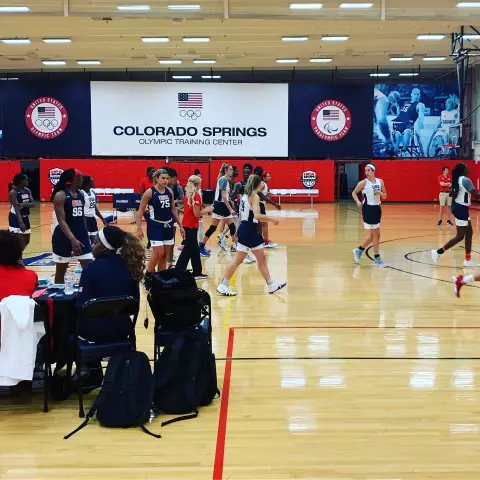- Author Rachel Wainwright wainwright@abchealthonline.com.
- Public 2023-12-15 07:39.
- Last modified 2025-11-02 20:14.
Sports doctor
A sports doctor is a qualified specialist who is responsible for preparing athletes for competition.

Sports medicine is a separate, specific area of medicine, the main purpose of which is to assess the readiness of athletes for competitions, as well as a multivariate assessment of their health.
Sports medicine workers also include the medical staff of gyms and facilities, who must be able to provide the necessary medical assistance to the victim and accompany him to a medical institution in the future.
The main components of sports medicine are:
- Sports Traumatology;
- Sports-related emergency medical care;
- Rehabilitation measures aimed at recovering athletes after injuries and illnesses, as well as increasing sports performance;
- Treatment of somatic diseases in athletes;
- Doping Control Service.
The main functions of a sports medicine doctor
A sports medicine doctor should be able to:
- Provide emergency medical care in case of emergency conditions while playing sports;
- Make decisions on the admission of an athlete to the chosen sport;
- To treat somatic and infectious diseases of athletes;
- Conduct a medical examination of athletes, taking into account the specifics of the sport, followed by a medical report for the coach;
- Monitor the health status and the level of the athlete's readiness for training and competitive activities;
- Conduct timely prevention and diagnosis of pathological conditions and injuries of the musculoskeletal system of athletes;
- Monitor the use of medicines by athletes.
Workplace of sports doctors
Sports doctors usually work:
- Children and youth sports schools;
- In the national teams of the country, national teams of cities, regions, professional and amateur sports clubs;
- Sports medicine centers.
Scientific research in sports medicine
In addition to functional and sports diagnostics, the main areas of scientific research carried out by sports medicine doctors are diagnostics and correction:
- Immune status;
- Somatic diseases;
- Injuries to the musculoskeletal system.
Research is also carried out in the field of rehabilitation of athletes after injuries and illnesses and recovery of athletes after training and competitive loads.
Requirements for a sports medicine doctor
The sports doctor belongs to one of the most important professions in sports. In terms of the breadth of knowledge in various fields of medicine, a sports doctor can be compared with a family doctor. In addition to knowledge in traumatology, he needs to be well versed in dietetics, psychology, cardiology, pharmacology, functional diagnostics and surgery. However, depending on the sport, the level of knowledge required in each of these areas may vary:
- For boxing, football and other traumatic sports, a sports doctor must know perfectly well traumatology;
- For biathlon, swimming and running - the human respiratory and cardiovascular systems.
Sports doctors of large sports teams, in addition to their main profession, must have good organizational skills. His responsibilities include supervising a sick athlete during diagnosis, treatment and rehabilitation.
Children's sports doctor
A children's sports doctor, as a rule, works in children's sports schools and accompanies teams in competitions. As in big sports, a pediatric sports doctor must be highly qualified in many areas of medicine. In addition, he must have knowledge of pediatrics and child and adolescent psychology.
Sports doctor's consultation
A sports doctor's consultation at a health center usually includes:
- Monitoring the state of health, as well as assessing the functional state, which is an important procedure not only for athletes, but also for people who make high demands on their physical condition. Thanks to the diagnostics carried out, it is possible at an early stage to identify abnormalities in the work of the musculoskeletal system, as well as to notice unfavorable trends in the functional state of the body, which will further prevent damage and injury. Thanks to the diagnostics of the organism, the sports doctor can assess the degree of readiness for the competition;
- Correction of the training process and assessment of the adequacy of physical activity;
- Selection of medicines depending on the focus and goals of physical activity;
- Restoration of physical condition and health by pharmacological and hardware means after hard training microcycles.
After consulting a sports doctor, you can undergo a physiotherapy course. Many physiotherapy methods have analgesic, sedative and anti-inflammatory effects, which help to increase human immunity. It is most effective to use them simultaneously with other medicinal products.
As a rule, a sports doctor, based on the characteristics of the course of the underlying disease and concomitant pathologies, prescribes a comprehensive program of physiotherapy procedures.
How to become a sports doctor
In order to work as a sports doctor after graduating from a medical university, you must complete a residency in sports medicine and exercise therapy. The training usually lasts two years.
To retrain a sports medicine physician, a four-month professional retraining course is required.
Pediatric sports doctors are not specialized in Russia. In order to obtain such a profession, it is also necessary to have knowledge in the field of pediatrics.
Found a mistake in the text? Select it and press Ctrl + Enter.






